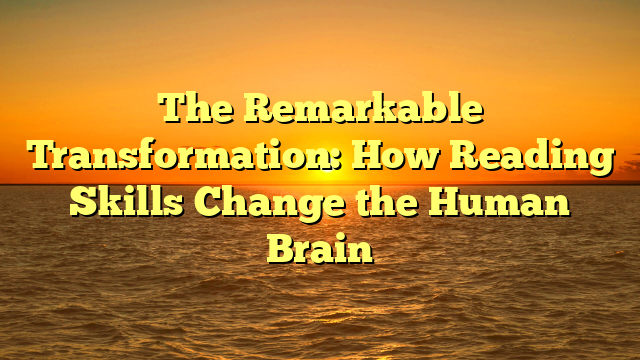Reading is a fundamental skill that shapes our cognitive development and plays a pivotal role in our daily lives. It’s not just about deciphering words on a page; it’s about how reading skills change the very structure and function of the human brain.
Contents
The Journey of Learning to Read: Brain Integration and Repurposing
The process of learning to read is a complex journey that begins with the integration of multiple brain regions. It’s not a single switch that gets flipped; rather, it’s a symphony of neural activity. As individuals embark on their reading journey, the brain starts repurposing existing functions to accommodate this newfound skill.
Key brain regions involved in reading and comprehension include the temporal lobe, which is responsible for phonological awareness. This crucial skill allows us to recognize and manipulate the sounds of language, a fundamental step in reading development. So, as we become proficient readers, our brains utilize the temporal lobe to decipher words and construct meaning from text.
The Left Side of the Brain: The Epicenter of Reading
Reading skills lead to remarkable changes in brain activity, particularly in the left side of the brain. This area is like the command center for reading. It’s where the magic happens. As reading skills improve, so does the level of brain activity in these key regions. It’s almost as if the brain recognizes the importance of reading and dedicates more resources to it.
Plasticity: The Brain’s Remarkable Adaptability
The brain’s ability to change and adapt is known as plasticity, and it’s one of the most incredible aspects of our neural architecture. Our brains are not static; they are dynamic and responsive. Learning to read is a perfect example of how our brains can adapt to new challenges. The brain regions involved in reading were originally developed for other, more basic needs, such as visual processing and language comprehension. However, reading repurposes these regions, demonstrating the brain’s remarkable plasticity.
Balancing the Scales: Changes in Both Sides of the Brain
Intensive reading instruction can lead to changes not only in the left side of the brain but also in the right. These changes in the right side of the brain are thought to compensate for weaknesses in the left, which is especially important for individuals with dyslexia. Dyslexia is a learning disorder that can make reading and language processing challenging. The brain’s ability to adapt and rewire itself helps individuals with dyslexia develop effective reading strategies.
The Fruits of Change: Improved Reading and Language Skills
As the brain undergoes these transformations, significant improvements in various aspects of reading and language functions become evident. These improvements include enhanced word reading, decoding skills, reading comprehension, and overall language proficiency. The brain’s changes make it possible for us to not only read words but also to understand and derive meaning from the text.
In summary, reading skills are not just about the words on a page; they are about the remarkable changes that occur within the human brain. These changes involve the integration and repurposing of multiple brain regions, increased activity in key areas, the brain’s remarkable plasticity, and the enhancement of various reading and language functions. However, it’s important to note that while we have made significant strides in understanding these changes, more research is needed to fully grasp the extent of these transformations and their implications, especially in the context of reading difficulties like dyslexia.
